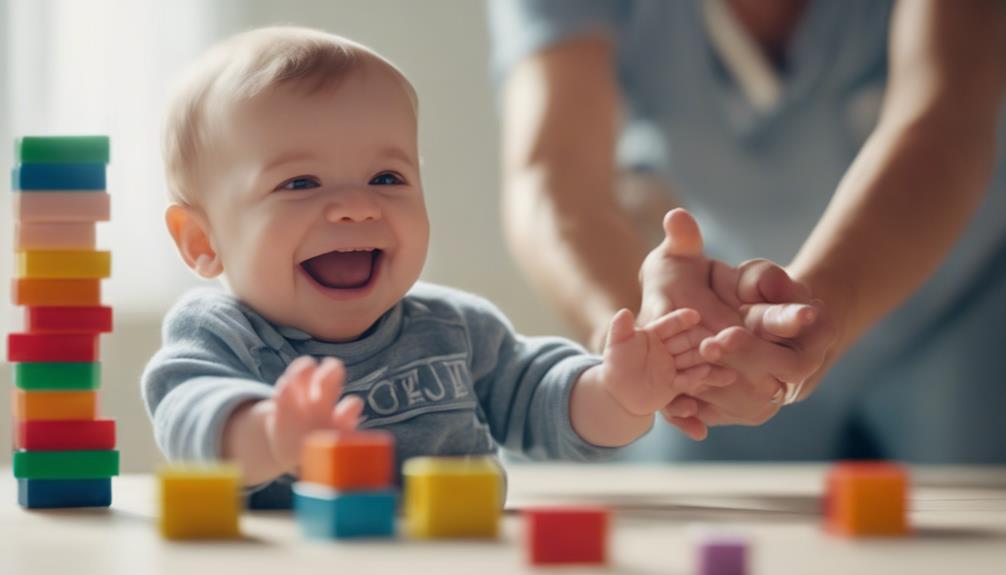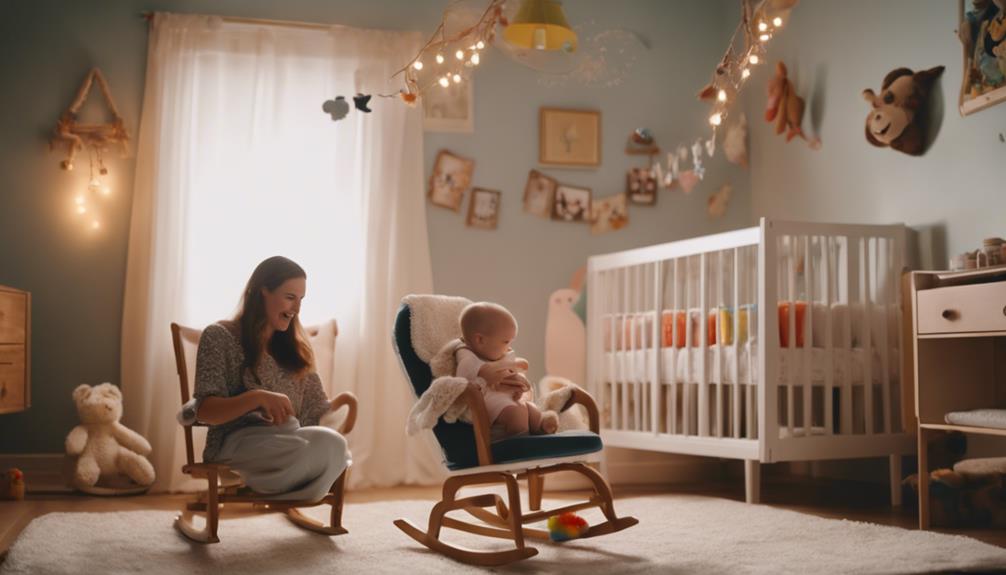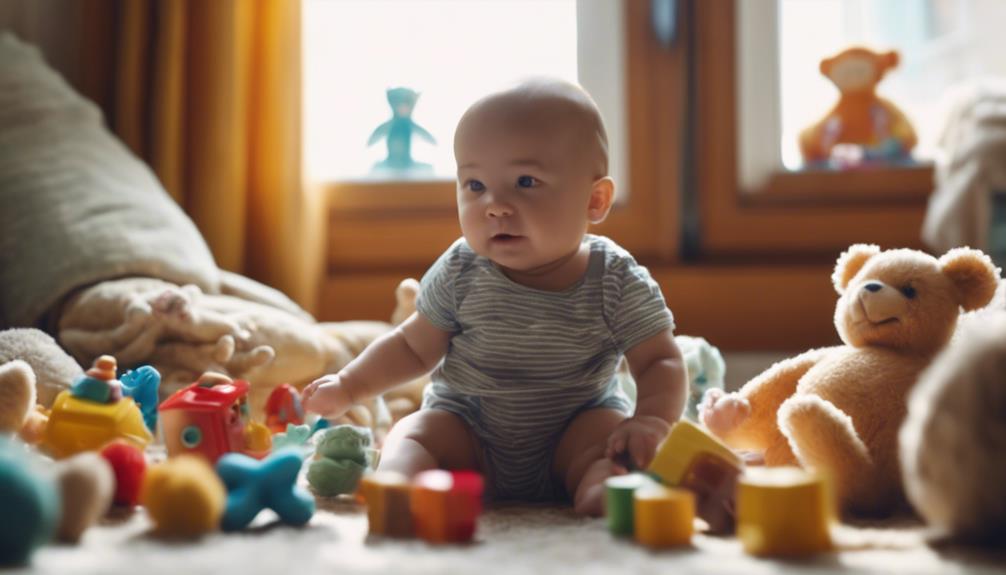To ensure a happy baby, establish a nurturing environment that emphasizes safety, stimulation, and support. Supply age-appropriate toys and promote tummy time to strengthen muscles. Implement a consistent schedule for feeding, napping, and playtime to promote security and consistency. Utilize positive reinforcement with specific praise and celebrate accomplishments to boost self-esteem. Foster a strong connection through eye contact, conversation, and responsiveness to cues. Cultivating a sensory-rich environment with various textures and sensory play promotes overall development. By following these guidelines, your little one will be on track for a happy beginning in life.
Key Takeaways
- Create a safe, stimulating environment for growth and exploration.
- Engage in sensory play to develop their senses and cognitive skills.
- Maintain a consistent routine to provide security and stability.
- Offer positive reinforcement to build self-esteem and confidence.
- Communicate effectively through bonding activities like talking and eye contact.
Creating a Nurturing Environment
To guarantee your baby's happiness, start by creating a nurturing environment that's safe, stimulating, and supportive. Bond with your baby by providing a space where they feel secure and loved. Make sure age-appropriate toys and sensory experiences are within reach to encourage learning and exploration.
Encourage tummy time to help strengthen muscles and promote motor skills development. This simple activity can have a significant impact on your baby's physical abilities.
Prioritize regular check-ups, vaccinations, hygiene practices, appropriate dressing, and milestone tracking for your baby's overall well-being. These steps are essential in ensuring your baby grows up healthy and happy.
Engaging in Sensory Play

Engage your baby in sensory play to stimulate their senses and foster holistic development. Here are some activities you can try:
- Texture Exploration:
Fill a bin with items of different textures like soft fabrics, smooth stones, and bumpy toys for your baby to touch and feel.
- Sensory Bottles:
Create sensory bottles using water, glitter, and small toys to provide visual stimulation and encourage hand-eye coordination.
- Musical Play:
Introduce your baby to various sounds by playing musical instruments or listening to different types of music together.
- Food Tasting:
Offer safe food items with different tastes like sweet fruits or bland crackers to help your baby explore new flavors and develop their sense of taste.
Maintaining a Consistent Routine

Establishing a consistent routine for your baby is key to promoting feelings of security and stability, ultimately contributing to their overall well-being. By following a set schedule for your baby's feeding, napping, and playtime, you create a structured environment that your baby will thrive in. This predictability helps reduce anxiety and promotes better sleep patterns, leading to emotional regulation and a happier baby overall.
To illustrate the importance of maintaining a consistent routine, consider the following table:
| Benefits of Consistent Routine for Babies |
|---|
| 1. Promotes feelings of security and stability |
| 2. Aids in emotional regulation |
| 3. Enhances overall well-being |
Consistency in your baby's daily activities teaches them about expectations, adjustments, and the flow of daily life. This predictability can improve your baby's mood, decrease fussiness, and ultimately contribute to their happiness. Remember, a consistent routine is essential for your baby's emotional well-being.
Offering Positive Reinforcement

When offering positive reinforcement to your baby, remember that it involves praising and rewarding good behavior to encourage its repetition.
Here are some effective ways to provide positive reinforcement:
- Offer Specific Praise: Use phrases like 'great job sharing your toy' to reinforce positive behavior clearly.
- Use Rewards: Giving a hug, high-five, or engaging in a special activity can motivate your baby to continue displaying positive actions.
- Be Consistent: Providing positive reinforcement consistently helps build your baby's self-esteem and strengthens your bond.
- Celebrate Achievements: Acknowledge and celebrate milestones, no matter how small, to encourage your baby's continued growth and development.
Effective Communication and Bonding

Regularly engaging in eye contact, talking, and singing with your baby strengthens the bond and promotes effective communication. By responding promptly to your baby's cues and needs, you build trust and security in the relationship. Positive reinforcement and affectionate touch are key in fostering a strong connection with your little one.
Practice active listening to understand your baby's non-verbal cues, such as facial expressions and body language, and respond appropriately. Establishing a predictable routine and incorporating interactive activities can enhance communication and bonding with your baby.
Remember, communication is a two-way street. As pediatrician Dr. Smith emphasizes, 'Babies may not speak, but they communicate through their actions and sounds. It's essential to pay attention to these cues to build a strong bond.'
Frequently Asked Questions
How Can I Make My Baby Super Happy?
You can make your baby super happy by engaging in interactive play, providing cuddles and affection, responding promptly to their needs, encouraging laughter, and creating a nurturing environment with age-appropriate toys and activities.
How to Have a Happy Baby During Pregnancy?
You can have a happy baby during pregnancy by prioritizing your well-being. Reduce stress, maintain a healthy lifestyle, bond with your baby through music and reading, practice relaxation techniques, and attend prenatal check-ups for a positive environment.
What Makes Some Babies so Happy?
You make babies happy by responding promptly to their needs, engaging in play, and showing affection. Cuddles, tummy time, and outdoor activities foster emotional well-being. Recognizing their signs of joy and bonding strengthens your connection with your baby.
What Are the Signs of a Happy Baby?
You can detect a happy baby through their babbling, attentive eyes, reaching out, kicking, quick breathing, smiles, laughter, relaxed fists, open hands, and calm demeanor. Recognizing these positive signs helps caregivers nurture a baby's emotional well-being.
Conclusion
In summary, by creating a nurturing environment, engaging in sensory play, maintaining a consistent routine, offering positive reinforcement, and practicing effective communication and bonding, you can help guarantee a happy baby.
Remember, consistency is vital in fostering a secure and contented child. As pediatrician Dr. Smith advises, 'Providing a loving and stable environment is essential for a baby's emotional well-being.'
So, take these tips and tricks to heart, and watch your baby thrive in happiness.










